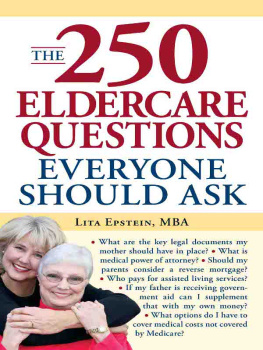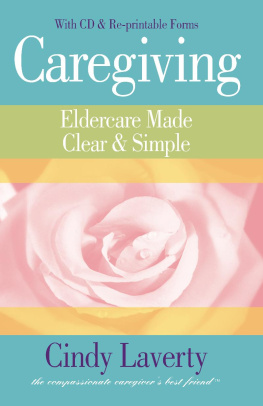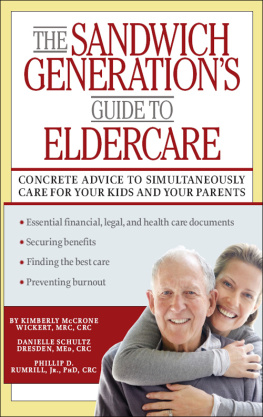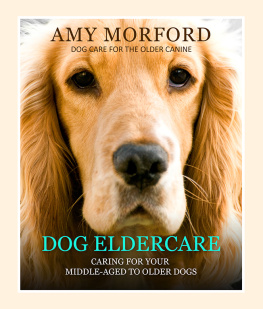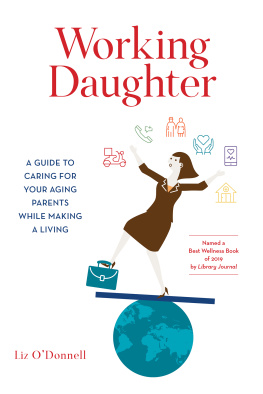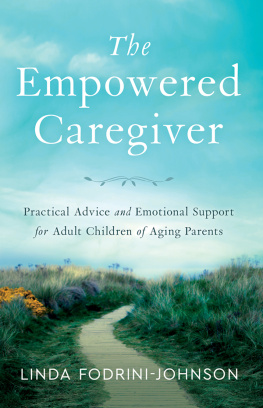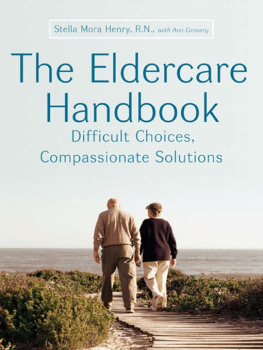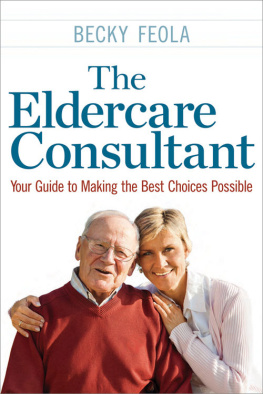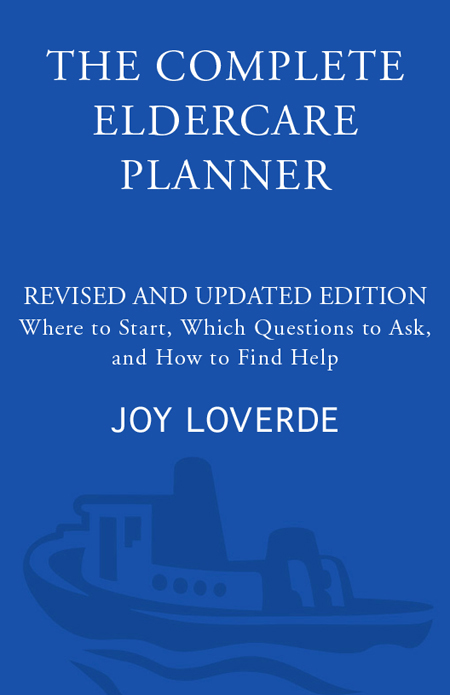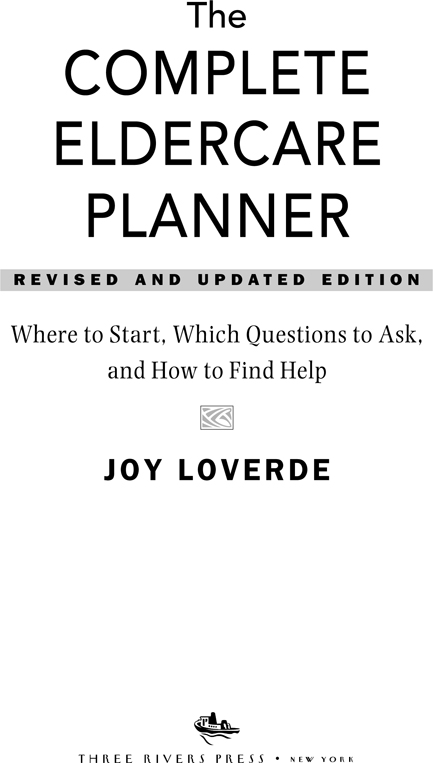INTRODUCTION
We don't choose eldercare. Eldercare chooses us.
When eldercare comes knocking on the door, many people run in the opposite direction; but not you. Whether you assumed the job, sought it, or inherited the responsibility out of obligation, even guilt, chances are if you are holding this book in your hands, you acceptedwillingly or otherwiseyour role as caregiver; yet caregiving has been part of your life plan all along.
Just as childhood, adolescence, young adulthood, and middle age are developmental phases of life, we acknowledge that someone we care about is going to get old and that someone is going to need care and attention. And we don't need 24/7 involvement to be considered a caregiver. We may be living with loved ones and caring for them, or we may be picking up the phone and checking in every once in a while. Whatever the case may be, when there are older people in our lives, and we've increased the amount of attention we give them, and we're starting to be more concerned, we are caregivers.
At first, eldercare may feel as if the rug has been pulled out from under you; you're falling and grabbing for somethinganythingsteady to hang on to, and there's nothing there. You laugh when things are sad; you cry when things go well. You never quite touch ground, and you soon realize that life is never going to be the same. People who once took care of you or walked by your side are now on another journey. You can walk with them for a while longer, then face the sad fact that they will ultimately leave you.
The caregiving journey will take you to places unimaginable, and in the process you will learn more about yourself than ever before. Each day has the potential to bring to the surface life-altering issues and events that offer you the opportunity to develop skills and talents you never knew you hadresourcefulness, stamina, flexibility, and faith, to name a few. You won't come away from the caregiving experience the same as when you started, nor will you look at life, and death, in the way you did before.
While even the kindest and most gracious older people can be difficult and demanding at times, ideally, you'll find a way to respond to them with empathy and love. Or you may tolerate your elders out of guilt and fear the burdens they represent, but beware of falling into the pity pit. Do not be blinded by the problem-solving elements of eldercare or you'll miss the valuable lessons they have to teach.
The simple truth about elders is this: They want their lives to be validated, and they do not want to die alone. Go to them as best you can and you will be rewarded handsomely. Elder-care wakes up the soul and brings us face-to-face with our own mortality. Eldercare teaches us to live in the present, and is the conduit that serves as a daily reminder of what is ultimately important in our lives. Let your elders lead, because every conversation is a privilege, and the moments we share with them bring us closer to who we are and make us wiser in ways that are eventually revealed to us over time.
We become the beneficiaries of these unique gifts the moment we find the courage to talk with our elders. Discussing eldercare issues and keeping the lines of communication open is never easy; consequently, many family members do not have the courage or endurance to do so. They may forfeit the chance to hear and say the most healing words of all, which can be spoken only after the hard work is done: Thank you for all you have done for me and I love you. Knowing how truly difficult the process of talking with older people can be, you will find numerous conversation tips throughout The Complete Eldercare Planner giving you every opportunity to engage in meaningful conversations that you will carry in your heart for the rest of your life.
There are no blueprints.
We do many things for our elders in the caregiving years. We rush to the hospital in the middle of the night, and we spend countless hours making telephone calls; we cook and clean up, and we make sure they take their medications; we listen to them complain, and we take them shopping for shoes; we watch television with them for hours, and we sit quietly as they doze. Caregiving is nothing less than a labor of love. We do what we have to do with the understanding that we have no way of knowing what lies ahead and how we'll cope.
Caregiving is full of surprises. There are countless stories of estranged parents who come looking for and expecting their children to care for them long after they abandoned them physically and emotionally. Mothers and fathers who are paying the price for their bad judgment are facing the fact that they now need help. The anger and resentment in this care giving situation is understandable. The question then becomes, do we abandon caring for parents who abandoned us or do we come to their rescue?
Seasoned family caregivers know all too well about the stresses of eldercare even under the best of circumstances: dwindling financial resources; care receivers who don't acknowledge kind deeds; and siblings and other family members who criticize our efforts and question our motives. And caregiving is not necessarily a short-term commitment. Over time, close relationships, our own health and wealth, and our jobs and careers are at risk if we're not careful.
There are no blueprints in caregiving, and so I offer the following self-assessment questionnaire to guide you. If anything else, the answers to these questions will reveal when it's time for you to supplement your care plans:
Do you get along with your elders and have a fair amount of influence over them?
Perhaps at times your sister gets along with Mom better than you do. People outside the family circle or an authority figure may be more influential and able to accomplish what you cannotperhaps a doctor, a member of the clergy a geriatric case manager, or an attorney may be able to step in on your behalf.
Do you live far away?
Be realistic about your ability to handle all of the eldercare details from a distance. Are there some things you simply cannot accomplish from far away? Is it realistic right now for you to pick up and move or ask your elder to do the same? Can you share duties with someone who lives closer?
Are you willing to ask for and accept help?
There is no getting around this one. If you have trouble delegating tasks or accepting help from others, then it's simply a matter of time before the quality of your own life will begin to crumble.
Do you have strong problem-solving abilities?
Day-to-day eldercare problems are complex, multidimensional, and sure to challenge the brightest of minds. If your confidence in researching options and making difficult decisions is low, you are better off surrounding yourself with professional advisers and, in some cases, letting geriatric case managers assess the situation and supplement the care and decision-making process.


